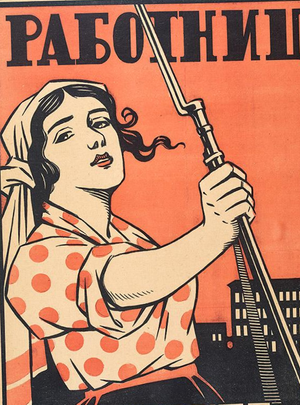In her article ‘Mutual Aid Can’t Do It Alone,’ The Nation author Dr. Joanna Wuest alleges that mutual aid is insufficient to support people in (and out of) crisis. She contends that while mutual aid is a useful tool, its efficacy pales in comparison to state programmes. Yet Wuest fails to engage the arguments of mutual aid’s progenitors and proponents. What results is a confused and potentially harmful perspective on a core anarchist principle that has sustained people for generations.
Mutual Aid and Anarchism
Mutual aid refers to the cooperation of individuals toward the greater good of the community. It’s an idea that’s been around for thousands of years, although its modern iteration emerged in the 1800s. Naturalist and anarchist Peter Kropotkin adopted ‘the law of Mutual Aid’ from an 1880 lecture on evolution by fellow Russian zoologist Dr. Karl Kessler. Kropotkin immediately embraced the ‘cursorily sketched out’ concept and expanded on the idea in his seminal work, Mutual Aid: A Factor of Evolution (1880). Kessler passed away the next year, but Kropotkin continued to develop the theory alongside other scientists, including the anarchist Dr. Marie Goldsmith, in the decades that followed.
Wuest touches on some of these points in her article for historical context. However, she stops short of addressing the totality of Kropotkin’s anarchism which is crucial to understanding why mutual aid became a cultural phenomenon. For example, she skirts around Kropotkin’s assertion that the government stands in direct opposition to mutual aid in order to make her point that mutual aid can, on the contrary, serve the State. As a consequence, her version presents something of a broken narrative between what someone said over a century ago and what we saw during the COVID-19 pandemic, rather than a strong ideological lineage of socialist thought.
In Mutual Aid, Kropotkin chronicled how societies across Europe thrived for hundreds of years functioning on principles of mutual aid through common use organisations. He argued that the emergence of the State in the 15th and 16th centuries led to the destruction of these communal institutions. As he writes:
‘For the next three centuries the States, both on the Continent and in these islands, systematically weeded out all institutions in which the mutual-aid tendency had formerly found its expression. … Political education, science, and law were rendered subservient to the idea of State centralization. It was taught in the universities and from the pulpit that the institutions in which men formerly used to embody their needs of mutual support could not be tolerated in a properly organized State; that the State alone could represent the bonds of union between its subjects; that federalism and “particularism” were the enemies of progress, and the State was the only proper initiator of further development. … The whole system of our State education was such that up to the present time, even in this country, a notable portion of society would treat as a revolutionary measure the concession of such rights as every one, freeman or serf, exercised five hundred years ago in the village folkmote, the guild, the parish, and the city.’
According to Kropotkin, the State inserted itself where there was already an extant system that served the needs of the people. Creating dependence on the State as the ultimate provider of aid was destructive to important community-led organisations, and quashed any sense of meaningful progress, regressing society to the point that its population couldn’t even dream of the freedom previously achieved in the stateless era. Avoiding this central argument allows Wuest to proceed rather absurdly with an article which props up the State as advancing, rather than destroying, mutual aid and its end goals.
Mutual Aid as a Buttress of the State?
Wuest runs with this rudimentary understanding of mutual aid to argue a baffling thesis. The thrust of her argument seems to be twofold. First, she pleads for mutual aid to be used to strengthen the State. She then claims that mutual aid initiatives have not scaled historically and thus are inferior to State programmes.
Mutual aid is a method by which anarchists attempt to bypass the State, and indeed demonstrate the State’s impotence when compared to collective organisation. In harmony with Kropotkin’s model of mutual aid as contradictory to state centralisation, Italian anarchist Errico Malatesta argued vociferously that the State is a barrier to solidarity and cooperation, while mutual aid and anarchism are a gateway. Framing mutual aid as a tool that should be used to fortify the State is therefore nonsensical from an anarchist perspective.
But let us ignore the inconvenience of these facts for a moment: Wuest's argument still undermines itself. If, as Wuest claims, mutual aid programmes are indeed inferior to the State because they don’t scale, then one must question their usefulness in entrenching the State's own agenda. After all, when building a house, it pays to lay down a foundation that is stronger than the structure it supports.
Wuest provides the perfect example of this incompatibility in her discussion of the Black Panthers’ Free Breakfast for School Children Program. As she mentions, the free breakfast programme was ultimately co-opted by the State, proof of its remarkable effectiveness. It was an overt instance of the State recognising the potential of mutual aid, thus viewing it as a threat to State authority. Then-FBI agent J. Edgar Hoover was explicit in this regard:
‘One of our primary aims in counterintelligence as it concerns the [Black Panther Party] is to keep this group isolated from the moderate black and white community which may support it. This is most emphatically pointed out in their Breakfast for Children Program, where they are actively soliciting and receiving support from uninformed whites and moderate blacks…You state that the Bureau under the [Counterintelligence Program] should not attack programs of community interest such as the [Black Panther Party] “Breakfast for Children.” You state that this is because many prominent “humanitarians,” both white and black, are interested in the program, as well as churches which are actively supporting it. You have obviously missed the point.’
Hoover followed up his rhetoric with numerous sabotage attempts as a broader part of COINTELPRO, resulting in blackmail, infiltration, imprisonment, and assassination of Black Panther leaders. Despite the onslaught of repression, the Black Panthers managed to serve 20,000 individuals by 1969. Wuest glides past these points to spuriously compare the federal programme’s national reach to the Panthers’ newly established and frequently besieged mutual aid initiatives.
Through both sabotage and a federal replacement programme, the State’s goal was not to help its citizens, but rather to suppress the Black Panthers’ mutual aid efforts and increase desperation and reliance on the State. We know this because the government already possessed the means to redistribute goods and capital at will; that they did not was a choice, and a damning indictment of the supposed reason for their very existence.
The State: A Fickle Ally At Best
When Wuest argues that the State presents a preferable alternative to mutual aid, she once again fails to interrogate anarchist critiques of the State and capitalism. If she had, she might have made space to explain how anarchists (and many other thinkers) view economic crises like the Long Depression (1873–1896) as an inevitability of capitalism, or how the New Deal’s eventual failures are endemic to the State itself. Wuest herself highlights how placing the good of the many in the hands of the few in the South as a result of the New Deal coalition led to the exclusion of the most vulnerable — Black farmers, poor white farmers, and women — yet comes to the conclusion this was a better system than benevolent societies which explicitly supported these same marginalised groups.
Wuest then laments the government’s subsequent pivot away from New Deal social safety nets. Recalling the trials of the American labour movement, Wuest catalogues how unions won a number of important gains for American workers only to see those victories crumble in Congressional battles. She blithely alludes to the American Federation of Labor (AFL) ‘turn[ing] its back’ on legislative reform for fear it would dilute their power before revealing that this is exactly what happened.
In his book, Who Rules America, sociologist Dr. G. William Domhoff states that the AFL in fact gained little by distancing themselves from anarchist and communist radicals in the hopes of achieving change through collaboration with the State. In contrast, he outlines how the union rank and file successfully used threats of a strike to force moderate AFL leadership and the government to acquiesce to labour’s demands. Despite bottom-up resistance, as more oppressive regimes gained federal power in America, support for the direct action tactics of 1877–1937 waned and the labour movement’s power eroded along with the welfare state they helped create.
Nowhere does Wuest consider that the very nature of governments, engines that naturally support the will of the most powerful, is necessarily fickle. Unions and solidarity movements, conversely, live beyond the election cycle. As she and Domhoff demonstrate, the State can turn on the worker at the drop of a hat as it comes under new economic pressures or less favorable management. This weakness of government is a point which anarchists have warned about for over 100 years. To acknowledge this, however, would threaten the core of Wuest’s thesis.
The Lie of Right-Wing ‘Mutual Aid’
Wuest’s next and more theatrical move is to characterise mutual aid as a darling of the right-wing. She muses that writers at The Heritage Foundation and The National Review dream of a society premised on the socialist system of mutual aid. This absurd notion only makes sense if you accede to the conservative conflation of mutual aid and charity. This conflation, as with so much on the Right, is mere smoke and mirrors perpetuated by those in power.
The first principle of mutual aid is that it is definitionally not charity. In brief, charity is unidirectional, voluntary, atomised, and depends on a system of power imbalance. Mutual aid rejects each of these ideas in kind. As a result, charity and mutual aid seek to build foundationally contrasting societies.
Charity always moves from people with means to people without. Consider a housed person giving food and money to a rough sleeper — charity in its most basic form. The dynamic flows in one direction, premised on the power differential between the individual with resources and the individual without. Because the resourced individual is the only one with the power to give, this interaction solidifies the housed person’s elevated social status. The transfer is made more unequal because it is only voluntary for the giver; the housed person isn’t obligated to help the rough sleeper, but the rough sleeper might solely rely on charity to survive. At the macro level, this act also fails to address the root causes that led to housing insecurity in the first place. This is because charity is an atomised process which impacts the individuals involved but does not effect communal or systemic change.
These ideas are orthogonal to mutual aid. In mutual aid, the goal is for all members of the community to have equal standing, giving and receiving from one another to whatever degree they can manage. One simple example of this might be a library, where books are given and taken as needed by everyone in the community without any consideration to personal status or means: from all for the wellbeing of all. Thus mutual aid depends on solidarity, not individual action; it is a shared expense and a shared benefit instead of a mere exchange between two people; it is necessary for everyone to participate for the good of the community; and in relying on communal interdependence, it does not reify social power dynamics, but rather helps erode them. It makes sense then that charity would be the concept of choice for pro-capitalist forces, like The Heritage Foundation and TNR, while those invested in a horizontalist, non-capitalist society might pursue mutual aid.
Wuest does at one point allude to the inescapable differences between mutual aid and charity, but doesn’t articulate precisely what those differences are. Whether she understands the difference becomes even less clear toward the end of the piece. To rebut the idea of mutual aid as a basis for societal organisation, she says curtly that ‘charitable giving actually plummets during recessions’ — once again synonymising mutual aid with charity despite earlier protestations. In fact, looking at the data on mutual aid rather than charity, more than 800 mutual aid groups have registered in the United States alone in the wake of the recession resulting from COVID-19. Whatever the data on charities, it is clear that mutual aid groups are stepping up to provide assistance to those facing immiseration due to the inaction of the government.
Debunking the Myth of Right-Wing Leftism
Wuest’s two examples of conservative ‘mutual aid’ also fail to bear out her argument on their own terms. The first, an article from conservative think tank The Heritage Foundation, is focused on Black and Jewish struggle against racism and antisemitism. It’s a nice sentiment from a vile organisation, but it doesn’t even pretend to be about mutual aid and thus is not worth discussing here. The TNR article by self-described ‘Tory anarchist’ Cameron Hilditch is closer to the mark, but reveals the right wing’s sleight of hand when it comes to their critique of government. It is true that Hilditch does briefly namecheck mutual aid in his fever dream about privatising education. But like other instances of so-called ‘Libertarian’ thought, words are presented absent their context in service of ghastly ideals.
Mutual aid as a means of revolutionary change is explicitly anti-capitalist because it rejects atomisation and hierarchy; charity is a natural outcropping of capitalism. Mutual aid also, as noted, promotes community rather than laying everything at the feet of the individual. Writing for TNR, Hilditch is transparently uninterested in these ideas. Instead, the lede of his article is explicit about crushing teacher’s unions. Hilditch argues that teacher’s unions, like ‘other public-sector unions,’ are anti-democratic and malevolent. In his fantasy, he would construct ‘private co-operative schools’ where teachers and staff are prohibited from collective bargaining on behalf of themselves or the students. The idea that anyone could achieve this through mutual aid is oxymoronic: you cannot bring about anti-solidarity through solidarity. Wuest seems to implicitly accept the premise of Hilditch’s argument anyway.
The overt anti-union premise of Hilditch’s piece also reveals additional inconsistency in Wuest’s article. She correctly associates mutual aid and labor organising as ideologically consistent forms of solidarity. But if Hilditch’s thesis is explicitly anti-union, how can Wuest argue that he supports mutual aid in any recognisable form?
It is worth briefly discussing Cameron Hilditch’s anti-statism and dishonest appropriation of anarchist ideas. In his TNR article, Hilditch rails against the State without acknowledging the reasons anarchists (true libertarians) oppose the government. Perhaps the most succinct critique comes from Malatesta, who laid out his issues as follows:
‘Therefore in the age-long struggle between liberty and authority, or in other words between socialism and a class state, the question is not really one of changing the relationships between society and the individual; nor is it a question of increasing the independence of the individual at the expense of social interference or vice versa. But rather is it a question of preventing some individuals from oppressing others; of giving all individuals the same rights and the same means of action; and of replacing the initiative of the few, which inevitably results in the oppression of everybody else. It is after all a question of destroying once and for all the domination and exploitation of man by man, so that everyone can have a stake in the commonweal, and individual forces, instead of being destroyed or fighting among themselves or being cut off from each other, will find the possibility of complete fulfilment, and come together for the greater benefit of everybody.’
Right-wing ‘Libertarianism’ twists anti-statism into a rebellion against government simply because it is the government, rather than because it is an engine of class dominance and exploitation. This allows them to continue to support capitalism and the capitalist class, which is built upon the hierarchical exercise of power. In La Questione Sociale (1899), Malatesta drives home the absurdity of such a position:
‘All other considerations apart, it is in our interest always to be on the side of freedom, because, as a minority proclaiming freedom for all, we would be in a stronger position to demand that others should respect our freedom; and if we are a majority we will have no reason, if we really do not aspire to dominate, to violate the freedom of others…. So freedom for everybody and in everything, with the only limit of the equal freedom for others; which does not mean—it is almost ridiculous to have to point this out—that we recognise, and wish to respect, the “freedom” to exploit, to oppress, to command, which is oppression and certainly not freedom.’
Anarchists throughout history have opposed all hierarchies and actively seek to abolish those systems, giving lie to any pretense capitalist ‘Libertarians’ like Hilditch may put forward about representing anarchism or anarchist concepts. ‘Libertarians’ oppose government because they long for a ‘free’ society where important decisions are made by those with the most power and wealth. Therefore their version of ‘mutual aid’ is charity and their idea of protecting workers and students is crushing the unions fighting for both, all while their ‘liberty’ peeks meekly out from under the boot of a corporation.
When Wuest cites the TNR piece as an example of the Right promoting mutual aid, she indulges the faux legitimacy of ‘Libertarianism’ as a serious political philosophy. This becomes especially evident when she refers to ‘despotic individualism’ as the ‘natural condition’ of statelessness. Here she echoes the ‘war of each against all’ coined by philosopher Thomas Hobbes in his 1651 defense of a sovereign central power. If Wuest is taking frauds like Hilditch as spokespeople for anarchism and mutual aid, she’s right to invoke a Hobbesian concern: their philosophies will indeed lead to a feudalistic, Mad Max-style hellscape. But that’s nothing like the society anarchists advocate for. In his 1891 pamphlet, Anarchy, Malatesta contradicts Wuest’s point directly:
‘...the abolition of government does not and cannot mean the breakdown of the social link. Quite the contrary, cooperation which today is imposed and directed to the benefit of a few, would be free, voluntary and directed to everybody’s interests; and therefore it would become that much more widespread and effective.
Social instinct, the sentiment of solidarity, would be developed to the highest degree; and every man would strive to do his best for everybody else, both to satisfy his intimate feelings as well as for his clearly understood interest.’
To accept Hilditch’s worldview as anarchism is to cede the ground to the Austrian School as the standard bearer of free socialist thought. These ideas should be recognized for what they really are: sinister inversions masked with doublespeak.
To be clear, there are meaningful critiques of how anarchy might function, such as how society will coordinate internationally to produce complex goods, and Wuest may have proposed solving these issues with government. However, because Wuest does not mention core anarchist arguments in the first place, she cannot begin to rebut them. Instead, she does the only thing she can do: dismiss their desires out of hand as mere ‘romanticism’ and ‘delusion,’ the stuff of ‘pamphlets strewn about folding tables.’
Conclusion
Even a well-meaning essay can be destructive if it misrepresents its central concepts. It is clear that Wuest is broadly interested in the wellbeing of everyone, especially the most vulnerable. It is therefore frustrating to read her essay; we on the Left cannot afford to waste time distorting one another’s views in our pursuit of an equitable and free society. We certainly should not take cues from the right-wing as they appropriate and misinform about left-wing ideals. Our goal should be to work together to reduce oppression, promote cooperation, and provide for everyone, particularly the most vulnerable among us. Mutual aid is one of the best tools we have for doing just that. We must not cast it aside.
Special thanks to our patrons, John Walker, BoringAsian, Mr Jake P Walker, Joseph Sharples, Josh Stead, Dave, Bliss, Hol, Aryeh Calvin, Rylee Lawson, Meghan Morales, Kimonoko, Aaron
Please consider giving us your support:







